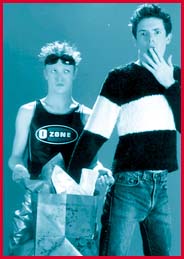Looking back, the success of Mark Ravenhill’s first full-length play is astonishing because, easily, it could have been dealt an immediate death blow. It opened in London, England in 1996 and there was the risk that the title, and the play as a whole, would be dismissed as nothing but sensationalism.
Thankfully, theatre critics didn’t get their noses out of joint about that fucking word and reviewed the play, itself.
The second test was the sex – including everything from three-ways to rimming. “Even if it had been out a couple of years before, it would have been seen as a gay play,” admits Ravenhill. “But I think there have been so many gay plays on the London stage in the last five years, that the sexuality of the characters doesn’t define what the play is about. It becomes a play about other things. Which is good, I think.”
It is good because Shopping And Fucking is resolutely concerned with bigger things than the two activities mentioned in its title. Violent sex and adventures in shopping do figure prominently, but they are present in order to prove that the play’s characters need other things in their lives, too. Essentially, Shopping And Fucking is a searing critique – with some satisfyingly dark humour – of consumer capitalism and how people’s lives are warped under its power.
“The characters in the play – their whole world has been defined by money and they’re very powerless people,” explains Ravenhill. “One way they can use power is to be violent towards somebody else. Particularly, the young boy [Gary, a 14-year-old hustler] has had a completely powerless, violent existence. And oddly, but truthfully, he fantasizes, like people do – about something even more powerless and even more violent than real life, rather than fantasizing about something that will save him.”
Ravenhill’s willingness to explore how individuals fetishize violence within the context of larger, external structures, is what makes Shopping And Fucking truly controversial. “The young boy’s fantasy is not a positive affirmation of sexuality at all,” he says. “It’s repeating a cycle of abuse, magnifying it.
“The play isn’t written as a critique of SM sex as an adult recreational thing,” he adds. “Obviously, two consenting adults agreeing to role play and fantasize about a situation is a different thing, but I think lots of times when power and violence are used in sex it’s there for pretty awful reasons.”
Hollywood screenwriters may be able to create the most harrowing of world views and still force feed a saccharine ending, but Ravenhill’s brand of play writing doesn’t allow that. “Given what’s happened in the play, I think it’s as optimistic an ending as is possible,” he says, referring to the glimmer of hope in the last scene. “Also, given that the condition that has created the world of the play – money being the only thing that defines the world – is not going to change overnight, it would be untruthful to have a happy, happy ending.
“There are a few references to Chekhov and the characters at the end of his plays often say: ‘Things are going to get better but it may be in 300 years time.’ I think that’s probably where we are now. There doesn’t seem to be any immediate solution to the problems of the world, but you keep on thinking, ‘Human beings are basically decent and things will eventually get better.’ But at the moment it’s very hard to see what political or social movement could reverse a lot of the horrors of capitalism.”
With Canada near the top in the you-can-have-it-all culture of capitalism, it is surprising, then, to learn that Ravenhill has been influenced by the works of two Canadians. “I think there is similar writing in Canada, certainly with Brad Fraser and Douglas Coupland there are similarities,” he says.
And having identified a Canadian mentality in sync with his own, Ravenhill hopes that the first Canadian production, starring Damien Atkins, Matthew MacFadzean, Alex Poch-Goldin, Natalie Radford and Julian Richings, and directed by Jim Millan of Crow’s Theatre, will be as popular with audiences as several US productions have been. “I think people of that generation [in their 20s and 30s] do have a sense of having got an education and still having to do terrible jobs, or no jobs. Money’s harder to come by and things are being privatized. That’s a fairly common experience, isn’t it? America’s certainly had no problem with that. They recognize that as being a truthful thing.”
On the subject of truth, Ravenhill is patient when I ask whether it’s true that Shopping And Fucking is repeatedly compared to Trainspotting. “It’s been part of the life of the play, that it’s always been compared to Trainspotting,” he admits. “I don’t really mind, but I don’t think it’s that similar. I think Shopping And Fucking is a bit more thoughtful than Trainspotting. And it’s more gay, obviously.”
With the success of Shopping And Fucking, Ravenhill can afford to be philosophical about the good, bad and silly media scrutiny of his work. He even laughs when I apologize in advance for posing an annoying question about him exemplifying that imaginary thing, Cool Britannia. “I don’t think a Canadian knows how to be annoying, you’re all too sweet.”

 Why you can trust Xtra
Why you can trust Xtra


